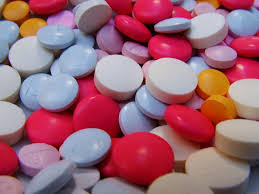Symptom Finder - Euphoria
EUPHORIA
Euphoria is characterized by a feeling of well-being, cheerfulness, and
optimism. It can be constant or intermittent. It may be psychogenic or
organic. The mnemonic VINDICATE will help recall the many causes of euphoria.
V—Vascular: Cerebral arteriosclerosis and stroke are rarely a cause of euphoria.
I—Inflammation: Aside from patients with general paresis or a frontal lobe abscess, euphoria is also rarely associated with an infectious disease process.
N—Neoplasm: This should bring to mind frontal lobe tumors in which
the patient is not only euphoric but exhibits excessive jocularity, lack of insight, and poor memory for recent events.
D—Degenerative: In some cases of dementia, euphoria may present at
the outset.
I—Intoxication: Drugs such as amphetamines, lysergic acid diethylamide (LSD), and corticosteroid may produce a euphoric state. Cocaine and other narcotics may do the same.
C—Congenital: Patients with cerebral palsy and other congenital disorders of the brain may exhibit euphoria.
A—Autoimmune: Multiple sclerosis is associated with euphoria in many cases.
T—Trauma: This brings to mind the euphoria associated with a concussion and posttraumatic neurosis.
E—Endocrine: Hyperthyroidism and Cushing syndrome may be associated with euphoria, but depression is much more likely. Unfortunately, the mnemonic VINDICATE fails to remind us of psychogenic causes such as schizophrenia, manic–depressive psychosis, and psychopathic behavior disorders. Temporal lobe epilepsy may be
associated with intermittent euphoria.
.
Approach to the Diagnosis
Look for a history of drug use or abuse. A careful mental status examination may suggest early Alzheimer disease or other forms of dementia. Neurologic examination may show bilateral pyramidal tract signs indicating multiple sclerosis or papilledema indicating a brain tumor.
A venereal disease research laboratory (VDRL) test or urine drug screen may suggest the diagnosis. A neurologic consult should be ordered before proceeding with expensive tests such as a CT scan or MRI. Perhaps a psychiatrist should be consulted early in the workup.
Euphoria is characterized by a feeling of well-being, cheerfulness, and
optimism. It can be constant or intermittent. It may be psychogenic or
organic. The mnemonic VINDICATE will help recall the many causes of euphoria.
V—Vascular: Cerebral arteriosclerosis and stroke are rarely a cause of euphoria.
I—Inflammation: Aside from patients with general paresis or a frontal lobe abscess, euphoria is also rarely associated with an infectious disease process.
N—Neoplasm: This should bring to mind frontal lobe tumors in which
the patient is not only euphoric but exhibits excessive jocularity, lack of insight, and poor memory for recent events.
D—Degenerative: In some cases of dementia, euphoria may present at
the outset.
I—Intoxication: Drugs such as amphetamines, lysergic acid diethylamide (LSD), and corticosteroid may produce a euphoric state. Cocaine and other narcotics may do the same.
C—Congenital: Patients with cerebral palsy and other congenital disorders of the brain may exhibit euphoria.
A—Autoimmune: Multiple sclerosis is associated with euphoria in many cases.
T—Trauma: This brings to mind the euphoria associated with a concussion and posttraumatic neurosis.
E—Endocrine: Hyperthyroidism and Cushing syndrome may be associated with euphoria, but depression is much more likely. Unfortunately, the mnemonic VINDICATE fails to remind us of psychogenic causes such as schizophrenia, manic–depressive psychosis, and psychopathic behavior disorders. Temporal lobe epilepsy may be
associated with intermittent euphoria.
.
Approach to the Diagnosis
Look for a history of drug use or abuse. A careful mental status examination may suggest early Alzheimer disease or other forms of dementia. Neurologic examination may show bilateral pyramidal tract signs indicating multiple sclerosis or papilledema indicating a brain tumor.
A venereal disease research laboratory (VDRL) test or urine drug screen may suggest the diagnosis. A neurologic consult should be ordered before proceeding with expensive tests such as a CT scan or MRI. Perhaps a psychiatrist should be consulted early in the workup.

